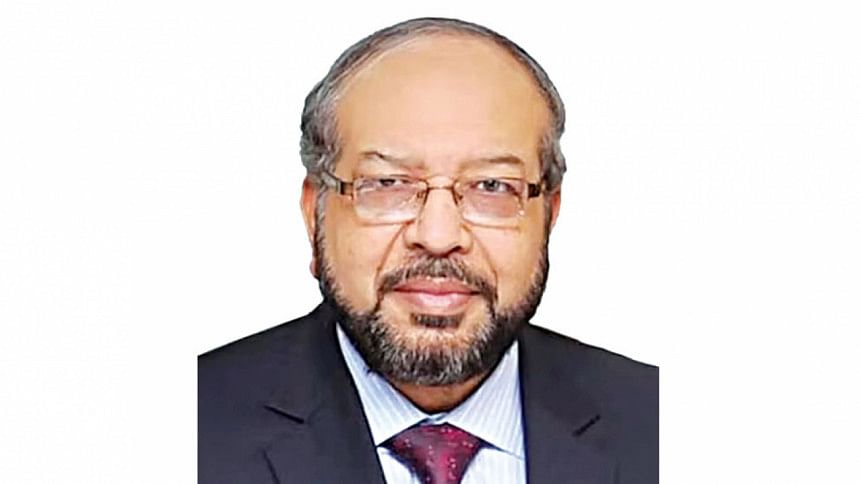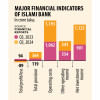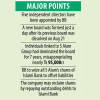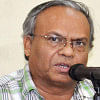‘I was forced to step down’

Islami Bank's former managing director Abdul Mannan had not appeared or spoken publicly since S Alam Group took control of the bank in March 2017.
Breaking more than seven years of silence yesterday, he said the infamous conglomerate forced Mannan at gunpoint to resign from his post at the Shariah-based bank after he was taken hostage by members of a security agency.
"I was forced to resign on a pad that the Islami Bank has never used since its inception in 1983 till date," Mannan said at a discussion yesterday where he recalled a few memories of his forced removal at that time.
The Forum for Bangladesh Studies organised the virtual event on "Elimination of Occupancy in the Banking Sector: Will the Plight End?".
Commemorating the deaths in the recent student-led movement that ousted the Awami League regime on August 5, he said: "Now I think I have freedom of expression. Earlier, I did not have the courage to speak even while staying abroad."
In his short speech, he said the day he was taken hostage and forced to resign at gunpoint, many top officials of Bangladesh Bank (BB) had stayed in their offices until late at night to accept his resignation.
After taking control of the board by removal of Mannan and other top executives, the Chattogram-based conglomerate, owned by Mohammad Saiful Alam, and its associated companies took loans of Tk 74,900 crore from the bank, which is 47 percent of Islami Bank's total outstanding loans as of March this year, according to the documents of the bank.
'RETURN BANK OWNERSHIP TO DEPOSITORS'
Addressing the event, economists and experts urged the interim government and the BB to take immediate steps to bring the ownership of the banks back to the depositors to save the financial sector from further deterioration.
Rashed Al Mahmud Titumir, professor of development studies at the University of Dhaka, said depositors are the real owners of banks, but sadly the top executives of banks are considered the owners.
"Unfortunately, there are no banking laws in the country that recognise depositors as owners," he said.
Titumir said the interest of depositors and small and medium enterprises, who are the backbone of the economy, must be reflected in the upcoming reforms in the banking sector for sustainable development.
He said there is no actual data on the exact amount of bad loans.
"We could know the amount if a forensic audit was conducted."
Mamun Rashid, chairman of Financial Excellence Ltd, said the BB has calculated the bad loans amounting to Tk 1.82 lakh crore, but it has given an estimate of Tk 3.77 lakh crore as soured loans to the International Monetary Fund.
The amount is about 20 percent of the total disbursed loans of the banks.
If a forensic audit is conducted, the exact amount, likely to be much higher, will be known, he added.
About the money laundered out of Bangladesh, Mamun said there was information that "large sums were borrowed from banks in the morning, and the money sent abroad through hundi in the afternoon".
S Alam took over six banks, he said. But the banking rules state that more than 10 percent of a bank's shares cannot be given to any person or entity. It was irresponsible on the part of the central bank.
S Alam's ownership share in Islami Bank is about Tk 1,800 crore. As a single beneficiary, S Alam Group withdrew about Tk 50,000 crore from the bank when the bank had deposits of Tk 160,000 crore.
"Now the question from all quarters is, how did S Alam come into picture? Islami Bank's managing director and board members were taken to a five-star hotel where they were forced to resign and a new managing director was appointed overnight at supersonic speed. This was the S Alam method of becoming the owner of one bank after another."
Badiul Alam Majumdar, secretary of Shushashoner Jonno Nagorik (Shujan), said corruption in banking and other sectors is rooted in the petty politics of the country.
"To get out of this situation, reforms are needed in the political culture first," he added.
Mizanur Rahman, economist, columnist and an adjunct professor of Manarat International University, also spoke at the event moderated by journalist Monir Haider.

 For all latest news, follow The Daily Star's Google News channel.
For all latest news, follow The Daily Star's Google News channel. 








Comments